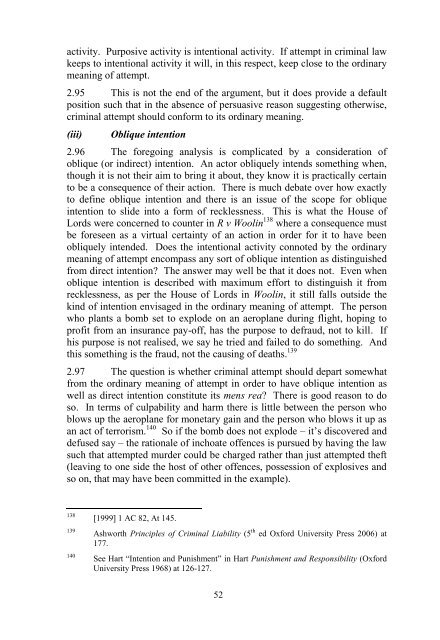Consultation Paper on Inchoate Offences - Law Reform Commission
Consultation Paper on Inchoate Offences - Law Reform Commission
Consultation Paper on Inchoate Offences - Law Reform Commission
You also want an ePaper? Increase the reach of your titles
YUMPU automatically turns print PDFs into web optimized ePapers that Google loves.
activity. Purposive activity is intenti<strong>on</strong>al activity. If attempt in criminal lawkeeps to intenti<strong>on</strong>al activity it will, in this respect, keep close to the ordinarymeaning of attempt.2.95 This is not the end of the argument, but it does provide a defaultpositi<strong>on</strong> such that in the absence of persuasive reas<strong>on</strong> suggesting otherwise,criminal attempt should c<strong>on</strong>form to its ordinary meaning.(iii)Oblique intenti<strong>on</strong>2.96 The foregoing analysis is complicated by a c<strong>on</strong>siderati<strong>on</strong> ofoblique (or indirect) intenti<strong>on</strong>. An actor obliquely intends something when,though it is not their aim to bring it about, they know it is practically certainto be a c<strong>on</strong>sequence of their acti<strong>on</strong>. There is much debate over how exactlyto define oblique intenti<strong>on</strong> and there is an issue of the scope for obliqueintenti<strong>on</strong> to slide into a form of recklessness. This is what the House ofLords were c<strong>on</strong>cerned to counter in R v Woolin 138 where a c<strong>on</strong>sequence mustbe foreseen as a virtual certainty of an acti<strong>on</strong> in order for it to have beenobliquely intended. Does the intenti<strong>on</strong>al activity c<strong>on</strong>noted by the ordinarymeaning of attempt encompass any sort of oblique intenti<strong>on</strong> as distinguishedfrom direct intenti<strong>on</strong>? The answer may well be that it does not. Even whenoblique intenti<strong>on</strong> is described with maximum effort to distinguish it fromrecklessness, as per the House of Lords in Woolin, it still falls outside thekind of intenti<strong>on</strong> envisaged in the ordinary meaning of attempt. The pers<strong>on</strong>who plants a bomb set to explode <strong>on</strong> an aeroplane during flight, hoping toprofit from an insurance pay-off, has the purpose to defraud, not to kill. Ifhis purpose is not realised, we say he tried and failed to do something. Andthis something is the fraud, not the causing of deaths. 1392.97 The questi<strong>on</strong> is whether criminal attempt should depart somewhatfrom the ordinary meaning of attempt in order to have oblique intenti<strong>on</strong> aswell as direct intenti<strong>on</strong> c<strong>on</strong>stitute its mens rea? There is good reas<strong>on</strong> to doso. In terms of culpability and harm there is little between the pers<strong>on</strong> whoblows up the aeroplane for m<strong>on</strong>etary gain and the pers<strong>on</strong> who blows it up asan act of terrorism. 140 So if the bomb does not explode – it‟s discovered anddefused say – the rati<strong>on</strong>ale of inchoate offences is pursued by having the lawsuch that attempted murder could be charged rather than just attempted theft(leaving to <strong>on</strong>e side the host of other offences, possessi<strong>on</strong> of explosives andso <strong>on</strong>, that may have been committed in the example).138139140[1999] 1 AC 82, At 145.Ashworth Principles of Criminal Liability (5 th ed Oxford University Press 2006) at177.See Hart “Intenti<strong>on</strong> and Punishment” in Hart Punishment and Resp<strong>on</strong>sibility (OxfordUniversity Press 1968) at 126-127.52
















